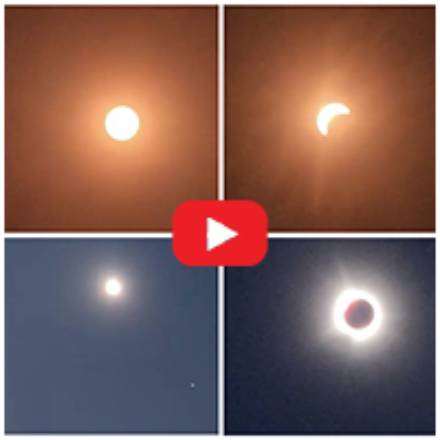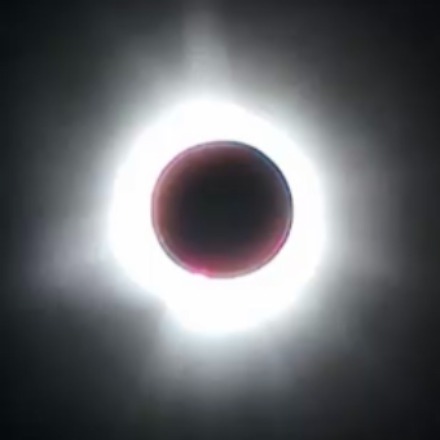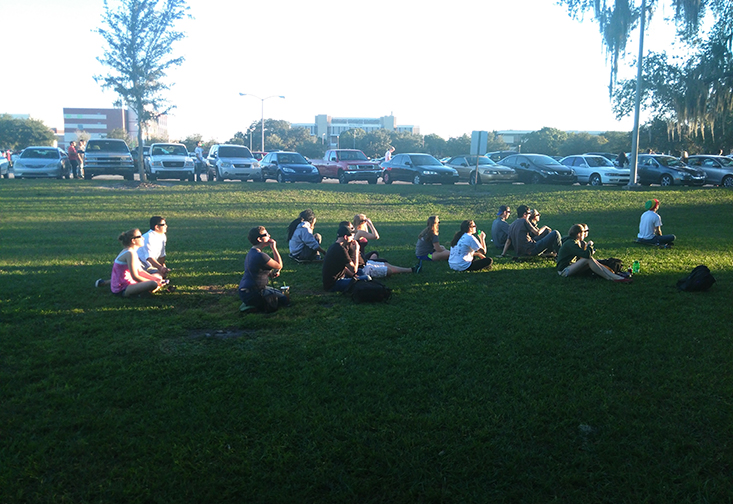By Sarah Sell, University Communications and Marketing
Astronomy Professor of Instruction Kevin MacKay was determined to make his upcoming road trip better than the one in 1999 when he took a group of students to England to see a total solar eclipse. Moments before the big event, clouds rolled in, obstructing their view. Although it was a great experience, he always wanted to try it again.
On April 8, MacKay got that second chance.
He drove just over 14 hours from Tampa to Conway, AR where he watched the historic event from a parking lot. He didn't take students this time around due to the housing demand and the event's popularity. Most standard hotel rooms in the path were sold out or going for more than $1,000 a night.

The phases of the total solar eclipse as witness by MacKay, who captured video of the event on his cell phone.
The total solar eclipse, which occurs when the moon passes between the sun and Earth, completely blocking the sun, crossed North America, passing over Mexico and into the United States. Several U.S. cities, including Arkansas were in the path of totality. It won't happen again in the U.S. for another 20 years.
"I told my students I didn't know what I would do if anything went wrong. I would probably lose my mind because of how far I traveled in 1999," said MacKay, the coordinator of undergraduate astronomy in the USF Department of Physics.
In August 1999, MacKay was teaching at a community college in Northern Ireland. He took four students on a cross-country road trip to see the total solar eclipse in Cornwall, England. They took a ferry across the Irish Sea and drove 10 hours to MacKay's father's house in London. After a brief visit, they drove five more hours to Cornwall, where they could experience the full effect of the eclipse. Despite clouds moving in twenty minutes before it happened, it was still an incredible sight.
"It was a surreal experience; how nature reacts to it is quite crazy. If I was to describe it, it was like God turning down a dimmer switch," MacKay said. "We were staying on a farm, and there were birds and sheep in the field at 12:30 in the afternoon. They all went quiet. So, you had this real eerie sense that something foreboding was about to happen."
MacKay started a project related to the total solar eclipse for his students before he left and shared his video with them when he returned.
Solar eclipses can occur every six months somewhere around the world and a total solar eclipse happens roughly once every three years.

McKay's photo of the 2024 total solar exclipse. He cut a piece of lens from his solar glasses and placed it over his phone to take the picture.
But they are rare in the U.S. A total solar eclipse event hasn't happened here since 2017. MacKay wanted to go see that one too, but it was the first day of classes at USF. Instead, he took students outside, where they wore solar glasses and witnessed an 80 percent eclipse of the sun.
This time around, MacKay encouraged his students to experience it directly: whether it was on a road trip to the path of totality or simply watching it at home on one of the many news programs that broadcasted it live.
"Its significance has only to do with proximity. It's close to a large population of our country. That's what makes it great in that aspect. For me, this is a big event, and that's why I don't have a problem driving a thousand miles to witness it," he said.
The next total solar eclipse will take place in the 2045. The good news is Tampa Bay will be in the path of totality and is expected to last for six minutes!
